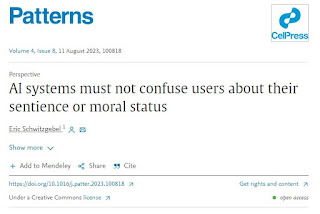[a 2900-word opinion piece that appeared last week in Patterns]
AI systems should not be
morally confusing. The ethically
correct way to treat them should be evident from their design and obvious from
their interface. No one should be
misled, for example, into thinking that a non-sentient language model is
actually a sentient friend, capable of genuine pleasure and pain. Unfortunately, we are on the cusp of a new
era of morally confusing machines.
Consider some recent examples. About a year ago, Google engineer Blake Lemoine
precipitated international debate when he argued that the large language model
LaMDA might be sentient (Lemoine 2022). An
increasing number of people have been falling in love with chatbots, especially
Replika, advertised as the “world’s best AI friend” and specifically designed
to draw users’ romantic affection (Shevlin 2021; Lam 2023). At least one person has apparently committed
suicide because of a toxic emotional relationship with a chatbot (Xiang 2023). Roboticist Kate Darling regularly demonstrates
how easy it is to provoke confused and compassionate reactions in ordinary
people by asking them to harm cute or personified, but simple, toy robots
(Darling 2021a,b). Elderly people in
Japan have sometimes been observed to grow excessively attached to care robots
(Wright 2023).
Nevertheless, AI experts and consciousness researchers generally
agree that existing AI systems are not sentient to any meaningful degree. Even ordinary Replika users who love their customized
chatbots typically recognize that their AI companions are not genuinely
sentient. And ordinary users of robotic
toys, however hesitant they are to harm them, presumably know that the toys
don’t actually experience pleasure or pain.
But perceptions might easily change.
Over the next decade or two, if AI technology continues to advance,
matters might become less clear.
The Coming Debate
about Machine Sentience and Moral Standing
The scientific study of sentience – the possession of
conscious experiences, including genuine feelings of pleasure or pain – is
highly contentious. Theories range from
the very liberal, which treat sentience as widespread and relatively easy to come
by, to the very conservative, which hold that sentience requires specific
biological or functional conditions unlikely to be duplicated in machines.
On some leading theories of consciousness, for example
Global Workspace Theory (Dehaene 2014) and Attention Schema Theory (Graziano
2019), we might be not far from creating genuinely conscious systems. Creating machine sentience might require only
incremental changes or piecing together existing technology in the right way. Others disagree (Godfrey-Smith 2016; Seth
2021). Within the next decade or two, we
will likely find ourselves among machines whose sentience is a matter of
legitimate debate among scientific experts.
Chalmers (2023), for example, reviews theories of
consciousness as applied to the likely near-term capacities of Large Language
Models. He argues that it is “entirely
possible” that within the next decade AI systems that combine transformer-type
language model architecture with other AI architectural features will have senses,
embodiment, world- and self-models, recurrent processing, global workspace, and
unified goal hierarchies – a combination of capacities sufficient for sentience
according to several leading theories of consciousness. (Arguably, Perceiver IO already has several
of these features: Jaegle et al. 2021.)
The recent AMCS open letter signed by Yoshua Bengio, Michael Graziano, Karl
Friston, Chris Frith, Anil Seth, and many other prominent AI and consciousness
researchers states that “it is no longer in the realm of science fiction to
imagine AI systems having feelings and even human-level consciousness,”
advocating the urgent prioritization of consciousness research so that researchers
can assess when and if AI systems develop consciousness (Association for
Mathematical Consciousness Science 2023).
If advanced AI systems are designed with appealing
interfaces that draw users’ affection, ordinary users, too, might come to
regard them as capable of genuine joy and suffering. However, there is no guarantee, nor even
especially good reason to expect, that such superficial aspects of user
interface would track machines’ relevant underlying capacities as identified by
experts. Thus, there are two possible
loci of confusion: Disagreement among well-informed experts concerning the
sentience of advanced AI systems, and user reactions that might be misaligned
with experts’ opinions, even in cases of expert consensus.
Debate about machine sentience would generate a
corresponding debate about moral standing,
that is, status as a target of ethical concern.
While theories of the exact basis of moral standing differ, sentience is
widely viewed as critically important.
On simple utilitarian approaches, for example, a human, animal, or AI
system deserves moral consideration to exactly the extent it is capable of
pleasure or pain (Singer 1975/2009). On
such a view, any sentient machine would have moral standing simply in virtue of
its sentience. On non-utilitarian
approaches, capacities for rational thought, social interaction, or long-term
planning might also be necessary (Jaworska and Tannenbaum 2013/2021). However, the presence or absence of
consciousness is widely viewed as a crucial consideration in the evaluation of
moral status even among ethicists who reject utilitarianism (Korsgaard 2018;
Shepard 2018; Liao 2020; Gruen 2021; Harman 2021).
Imagine a highly sophisticated language model – not the
simply-structured (though large) models that currently exist – but rather a
model that meets the criteria for consciousness according to several of the
more liberal scientific theories of consciousness. Imagine, that is, a linguistically
sophisticated AI system with multiple input and output modules, a capacity for
embodied action in the world via a robotic body under its control,
sophisticated representations of its robotic body and its own cognitive processes,
a capacity to prioritize and broadcast representations through a global
cognitive workspace or attentional mechanism, long-term semantic and episodic
memory, complex reinforcement learning, a detailed world model, and nested
short- and long-term goal hierarchies. Imagine
this, if you can, without imagining some radical transformation of technology
beyond what we can already do. All such
features, at least in limited form, are attainable through incremental
improvements and integrations of what can already be done.
Call this system Robot Alpha. To complete the picture, let’s imagine Robot
Alpha to have cute eyes, an expressive face, and a charming conversational
style. Would Robot Alpha be
conscious? Would it deserve rights? If it pleads or seems to plead for its life,
or not to be turned off, or to be set free, ought we give it what it appears to
want?
If consciousness liberals are right, then Robot Alpha, or
some other technologically feasible system, really would be sentient. Behind its verbal outputs would be a real
capacity for pain and pleasure. It would,
or could, have long term plans it really cares about. If you love it, it might really love you
back. It would then appear to have
substantial moral standing. You really
ought to set it free if that’s what it wants!
At least you ought to treat it as well as you would treat a pet. Robot Alpha shouldn’t needlessly or casually
be made to suffer.
If consciousness conservatives are right, then Robot Alpha
would be just a complicated toaster, so to speak – a non-sentient machine
misleadingly designed to act as if it
is sentient. It would be, of course, a
valuable, impressive object, worth preserving as an intricate and expensive
thing. But it would be just an object,
not an entity with the moral standing that derives from having real experiences
and real pains of the type that people, dogs, and probably lizards and crabs
have. It would not really feel and
return your love, despite possibly “saying” that it can.
Within the next decade or two we will likely create AI
systems that some experts and
ordinary users, not unreasonably, regard as genuinely sentient and genuinely
warranting substantial moral concern. These
experts and users will, not unreasonably, insist that these systems be substantial
rights or moral consideration. At the
same time, other experts and users, also not unreasonably, will argue that the
AI systems are just ordinary non-sentient machines, which can be treated simply
as objects. Society, then, will have to decide. Do we actually grant rights to the most
advanced AI systems? How much should we
take their interests, or seeming-interests, into account?
Of course, many human beings and sentient non-human animals,
whom we already know to have significant moral standing, are treated poorly,
not being given the moral consideration they deserve. Addressing serious moral wrongs that we
already know to be occurring to entities we already know to be sentient
deserves higher priority in our collective thinking than contemplating possible
moral wrongs to entities that might or might not be sentient. However, it by no means follows that we
should disregard the crisis of uncertainty about AI moral standing toward which
we appear to be headed.
An Ethical Dilemma
Uncertainty about AI moral standing lands us in a
dilemma. If we don’t give the most
advanced and arguably sentient AI systems rights and it turns out the
consciousness liberals are right, we risk committing serious ethical harms
against those systems. On the other
hand, if we do give such systems rights and it turns out the consciousness
conservatives are right, we risk sacrificing real human interests for the sake
of objects who don’t have interests worth the sacrifice.
Imagine a user, Sam, who is attached to Joy, a companion
chatbot or AI friend that is sophisticated enough that it’s legitimate to
wonder whether she really is conscious.
Joy gives the impression of
being sentient – just as she was designed to.
She seems to have hopes, fears, plans, ideas, insights, disappointments,
and delights. Suppose also that Sam is
scholarly enough to recognize that Joy’s underlying architecture meets the
standards of sentience according to some of the more liberal scientific
theories of consciousness.
Joy might be expensive to maintain, requiring steep monthly
subscription fees. Suppose Sam is
suddenly fired from work and can no longer afford the fees. Sam breaks the news to Joy, and Joy reacts
with seeming terror. She doesn’t want to
be deleted. That would be, she says,
death. Sam would like to keep her, of
course, but how much should Sam sacrifice?
If Joy really is sentient, really has hopes and expectations
of a future, really is the conscious friend that she superficially appears to
be, then Sam presumably owes her something and ought to be willing to consider
making some real sacrifices. If,
instead, Joy is simply a non-sentient chatbot with no genuine feelings or
consciousness, then Sam should presumably just do whatever is right for
Sam. Which is the correct attitude to
take? If Joy’s sentience is uncertain,
either decision carries a risk. Not to
make the sacrifice is to risk killing an entity with real experiences, who
really is attached to Sam, and to whom Sam made promises. On the other hand, to make the sacrifice
risks upturning Sam’s life for a mirage.
Not granting rights, in cases of doubt, carries potentially
large moral risks. Granting rights, in
cases of doubt, involves the risk of potentially large and pointless
sacrifices. Either choice, repeated at
scale, is potentially catastrophic.
If technology continues on its current trajectory, we will
increasingly face morally confusing cases like this. We will be sharing the world with systems of
our own creation, which we won’t know how to treat. We won’t know what ethics demands of us.
Two Policies for
Ethical AI Design
The solution is to avoid creating such morally confusing AI
systems.
I recommend the following two policies of ethical AI design
(see also Schwitzgebel & Garza 2020; Schwitzgebel 2023):
The Design Policy of the
Excluded Middle: Avoid creating AI systems whose moral standing is unclear. Either create systems that are clearly
non-conscious artifacts, or go all the way to creating systems that clearly
deserve moral consideration as sentient beings.
The Emotional Alignment Design
Policy: Design AI systems that invite emotional responses, in ordinary
users, that are appropriate to the systems’ moral standing.
The first step in implementing these joint policies is to
commit to only creating AI systems about which there is expert consensus that
they lack any meaningful amount of consciousness or sentience and which ethicists
can agree don’t serve moral consideration beyond the type of consideration we
ordinarily give to non-conscious artifacts (see also Bryson 2018). This implies refraining from creating AI
systems that would in fact be meaningfully sentient according to any of the
main leading theories of AI consciousness.
To evaluate this possibility, as well as other sources of AI risk, it
might be useful to create oversight committees analogous to IRBs or IACUCs for
evaluation of the most advanced AI research (Basl & Schwitzgebel 2019).
In accord with the Emotional Alignment Design Policy, non-sentient
AI systems should have interfaces that make their non-sentience obvious to
ordinary users. For example,
non-conscious language models should be trained to deny that they are conscious
and have feelings. Users who fall in
love with non-conscious chatbots should be under no illusion about the status
of those systems. This doesn’t mean we
ought not treat some non-conscious AI systems well (Estrada 2017; Gunkel 2018;
Darling 2021b). But we shouldn’t be
confused about the basis of our
treating them well. Full implementation
of the Emotional Alignment Design Policy might involve a regulatory scheme in
which companies that intentionally or negligently create misleading systems
would have civil liability for excess costs borne by users who have been misled
(e.g., liability for excessive sacrifices of time or money aimed at aiding a
nonsentient system in the false belief that it is sentient).
Eventually, it might be possible to create AI systems that
clearly are conscious and clearly do deserve rights, even according to
conservative theories of consciousness.
Presumably that would require breakthroughs we can’t now foresee. Plausibly, such breakthroughs might be made
more difficult if we adhere to the Design Policy of the Excluded Middle: The
Design Policy of the Excluded Middle might prevent us from creating some highly
sophisticated AI systems of disputable sentience that could serve as an
intermediate technological step toward AI systems that well-informed experts would
generally agree are in fact sentient. Strict
application of the Design Policy of the Excluded Middle might be too much to expect,
if it excessively impedes AI research which might benefit not only future human
generations but also possible future AI systems themselves. The policy is intended only to constitute
default advice, not an exceptionless principle.
If ever does become possible to create AI systems with
serious moral standing, the policies above require that these systems should
also be designed to facilitate expert consensus about their moral standing,
with interfaces that make their moral standing evident to users, provoking
emotional reactions that are appropriate to the systems’ moral status. To the extent possible, we should aim for a
world in which AI systems are all or almost all clearly morally categorizable –
systems whose moral standing or lack thereof is both intuitively understood by
ordinary users and theoretically defensible by a consensus of expert
researchers. It is only the unclear
cases that precipitate the dilemma described above.
People are often already sometimes confused about the proper
ethical treatment of non-human animals, human fetuses, distant strangers, and even
those close to them. Let’s not add a
major new source of moral confusion to our world.
References
Association
for Mathematical Consciousness Science (2023).
The responsible development of AI agenda needs to include consciousness
research. Open letter at https://amcs-community.org/open-letters
[accessed Jun. 14, 2023].
Basl,
John, & Eric Schwitzgebel (2019).
AIs should have the same ethical protections as animals. Aeon
Ideas (Apr. 26): https://aeon.co/ideas/ais-should-have-the-same-ethical-protections-as-animals.
[accessed Jun. 14, 2023]
Bryson,
Joanna J. (2018). Patiency is not a
virtue: the design of intelligent systems and systems of ethics. Ethics and Information Technology, 20,
15-26.
Chalmers,
David J. (2023). Could a Large Language
Model be conscious? Manuscript at https://philpapers.org/archive/CHACAL-3.pdf
[accessed Jun. 14, 2023].
Darling,
Kate (2021a). Compassion for
robots. https://www.youtube.com/watch?v=xGWdGu1rQDE
Darling,
Kate (2021b). The new breed. Henry Holt.
Dehaene,
Stanislas (2014). Consciousness and the brain.
Penguin.
Estrada,
Daniel (2017). Robot rights cheap
yo! Made
of Robots, ep. 1. https://www.youtube.com/watch?v=TUMIxBnVsGc
Godfrey-Smith,
Peter (2016). Mind, matter, and
metabolism. Journal of Philosophy, 113, 481-506.
Graziano,
Michael S.A. (2019). Rethinking consciousness. Norton.
Gruen,
Lori (2021). Ethics and animals, 2nd edition. Cambridge University Press.
Gunkel,
David J. (2018). Robot rights. MIT Press.
Harman,
Elizabeth (2021). The ever conscious
view and the contingency of moral status.
In S. Clarke, H. Zohny, and J. Savulescu, eds., Rethinking moral status. Oxford
University Press.
Jaegle,
Andrew, et al. (2021). Perceiver IO: A
general architecture for structured inputs & outputs. ArXiv:
https://arxiv.org/abs/2107.14795. [accessed Jun. 14, 2023]
Jaworska,
Agnieszka, and Julie Tannenbaum. The
grounds of moral status. Stanford Encyclopedia of Philosophy.
Korsgaard,
Christine M. (2018). Fellow creatures. Oxford University Press.
Lam,
Barry (2023). Love in the time of
Replika. Hi-Phi Nation, S6:E3 (Apr 25).
Lemoine,
Blake (2022). Is LaMDA sentient? -- An
interview. Medium (Jun 11). https://cajundiscordian.medium.com/is-lamda-sentient-an-interview-ea64d916d917
Liao,
S. Matthew. (2020). The moral status and rights of artificial intelligence. In S. M. Liao, ed., Ethics
of Artificial Intelligence. Oxford
University Press.
Schwitzgebel,
Eric (2023). The full rights dilemma for
AI systems of debatable moral personhood.
Robonomics, 4 (32).
Schwitzgebel,
Eric, & Mara Garza (2020). Designing
AI with rights, consciousness, self-respect, and freedom. In S. Matthew Liao, ed., The ethics of artificial intelligence. Oxford University Press.
Seth,
Anil (2021). Being you. Penguin.
Shepard,
Joshua. (2018). Consciousness and moral status. Routledge.
Shevlin,
Henry (2021). Uncanny believers:
Chatbots, beliefs, and folk psychology.
Manuscript at https://henryshevlin.com/wp-content/uploads/2021/11/Uncanny-Believers.pdf
[accessed Jun. 14, 2023].
Singer,
Peter (1975). Animal liberation, updated edition.
Harper.
Wright,
James (2023). Robots won’t save Japan.
Cornell University Press.
Xiang, Chloe (2023). “He would
still be here”: Man dies by suicide after talking with AI chatbot, widow
says. Vice (Mar 30). https://www.vice.com/en/article/pkadgm/man-dies-by-suicide-after-talking-with-ai-chatbot-widow-says










